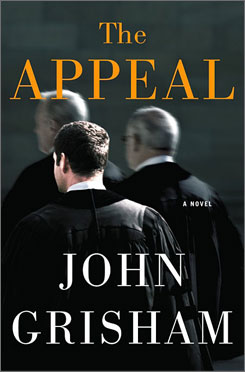January 29, 2008, - 1:33 pm
John Grisham’s Uber-Liberalism Gets Worse in Latest Diatribe, er . . . “Novel”
By Debbie Schlussel
On this site, I’ve repeatedly written about mystery and thriller novelists who couch their apologist views for Islamic terrorism and hatred of Israel and America in the midst of their books. Le Carre is one, Baldacci is another. Then, there’s North Patterson.
Then, there are the other liberal novelists who use their novels as trojan horses for other far-left views. The lastest is John Grisham. It’s well known that Grisham is a liberal and his views are evident in his novels. But his latest book–in stores, today–“The Appeal,” is nothing more than an anti-capitalist, anti-American diatribe, based on a review in today’s USA Today:


Money can’t buy love, but it can buy everything else, including a victory at the polls. That’s the compelling, if hardly unique, backdrop for The Appeal, John Grisham’s rant-against-dirty-politics legal thriller, on sale Tuesday. . . .
Not for the first time, Grisham uses his fiction to lambaste the amorality and greed of corporate America and the consequences suffered by its unwitting victims, mainly the defenseless poor. He has taken on the pharmaceutical, tobacco and insurance industries. This time it’s a fictional chemical company.
The Appeal begins with the shocking conclusion to a lawsuit filed against Krane Chemical by Jeannette Baker, a young woman who lost her son and husband to cancer within eight months. The $41 million settlement is unprecedented, and Krane isn’t taking it lightly. Jeannette is only one of hundreds of people in fictional Bowmore, Miss., who have been affected by Krane’s decades of dumping toxic waste in what has come to be known as Cancer County USA.
If the chemical company doesn’t get a reversal on appeal, future lawsuits on behalf of more than 160 cancer victims will drain its deep pockets, especially the gold-lined wallet of owner Carl Trudeau. He has vowed those “ignorant people” won’t get a dime of his money.
Meanwhile, he’s spending millions of his billions on his vapid trophy wife, junk art and most important, electing a limited-liability justice to the Mississippi Supreme Court who will deny Jeannette’s monetary award on appeal.
As always, Grisham’s depiction of the victims, their dedicated, flat-broke attorneys and the forces trying to erase Krane’s liability are poignant and dead-on. The novel’s conclusion is satisfying, somewhat grim, but nevertheless believable.
More than a novel, The Appeal is an expose of how highly organized special-interest groups, loaded with cash, can manipulate the judicial system. It’s Grisham’s bully pulpit for reform.
“There’s a lot of truth in this story,” Grisham writes in an author’s note. “As long as private money is allowed in judicial elections we will see competing interests fight for seats on the bench.”
It should be noted that former Supreme Court Justice Sandra Day O’Connor, who was a liberal and has turned into something of a communist bizarro in her post-Supe days, agrees with Grisham. She doesn’t want elections of judges. She wants them to be appointed and sit for life on the bench, without any accountability. Sorry, but that ain’t the way for justice.
And while it is naive to insist that there are no “bought” judges, elections, and verdicts in America, it is another thing to imply that this is the general case in America. I don’t think highly of most judges. They are generally lazy, of mediocre or lesser intelligence, and people who couldn’t or wouldn’t make it as a lawyer in the private sector. That said, while some are dishonest, Grisham’s wholesale indictment is absurd and harmful.
Are there corrupt CEOs in America and poor victims? Yes, there are plenty. But the vast majority of companies provide jobs and products that help American lives. And not all of the alleged victims’ lawyers are poor lawyers sacrificing for the good. Many are like John Edwards and Trent Lott’s brother-in-law Dickie Scruggs, suing the heck out of corporate America on behalf of questionable victims, in order to make their Bentley payments. Don’t look for that, though, in a Grisham novel. It gets in the way of his black-and-white views on corporate America.
One wonders whether Mr. Grisham will now open up his investment portfolio to America to show us in which of these evil titans he’s invested his book and movie fortunes. He’s not one of the little people he claims to be championing. In fact, he’s probably enabling their “evil” corporate oppressors.
Strong political views in a work of fiction are a strong indication. They are indicative of weak writers who don’t have any ideas or, in Grisham’s case, who’ve run out of ideas and must lean against a political construct to support the weak plot.
If only Grisham would read the words of his colleague, novlist Linda Grant, in her article, “The Pricks of Conscience,” in the January issue of Prospect Magazine.
In it, Grant quotes W. H. Auden, when asked his views on Vietnam:
Why writers should be canvassed for their opinions on political issues, I cannot imagine.
My, how times have changed. Today, writers cannot imagine why not. When people buy a legal thriller, that’s what they want to read. Not the author’s political agenda.
Tags: America, author, Bowmore, brother-in-law, cancer, Carl Trudeau, chemical, Debbie Schlussel On, Dickie Scruggs, fictional chemical, insurance industries, Israel, Jeannette Baker, jobs and products, John Edwards, John Grisham, lawyer in the private sector, Linda Grant, Mississippi, Mississippi Supreme Court, owner, pharmaceutical, Sandra Day O'Connor, Supreme Court Justice, Trent Lott, USA Today, USD, Vietnam


I’m willing to bet there’s corporate murder involved, somewhere in the book as well?
Other predictions (I haven’t read it)
– The plot doesn’t reveal itself until at least halfway through the book, because the first half of it is preachy and depressing (set up the emotional attachment to whoever dies)
– The big bad corporation gets what’s clearly Grisham’s idea of poetic justice in the end.
– Even though the storyline ends, there’s another half to full chapter, in order to reiterate his point.
CaptShady on January 29, 2008 at 2:57 pm